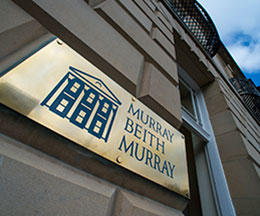Murray Beith Murray LLP is a leading Scottish private client law firm.
For 175 years we have specialised in meeting the legal, financial and administrative needs of individuals and families, family trusts, charities and private companies.
Murray Beith Murray LLP is a leading Scottish private client law firm.
For 175 years we have specialised in meeting the legal, financial and administrative needs of individuals and families, family trusts, charities and private companies.
 The legal systems of Scotland and England have their own traditions and interpretations. The result of this is often that each legal system has a different approach when it comes to dealing with issues that are common between them, such as how to administer the estate of someone who has died.
The legal systems of Scotland and England have their own traditions and interpretations. The result of this is often that each legal system has a different approach when it comes to dealing with issues that are common between them, such as how to administer the estate of someone who has died.
In England, the term ‘probate’ is used where there is a Will, while in Scotland, you will hear the word ‘confirmation’ whether or not there is a Will. Both terms relate to the administration of the deceased’s estate, however, their meaning and effect are different. Here, we explain what these terms mean as well as their differences and their similarities.
Probate applies in England and Wales when a person has died and they have left a Will. The executors named in the Will must apply for probate to give them the legal right to uplift and distribute the estate.
Confirmation in Scotland is the document issued by the court that provides the executors with the legal authority to administer the estate of the deceased.
Although both systems are used to administer the deceased's estate, their differences extend further than simply the terms used.
For example, in Scotland, the court can grant the confirmation document to executors named in the Will or, if there is no Will, to executors appointed by the court.
In England and Wales, however, if there is no Will, probate cannot be applied for. Instead, the next of kin must apply for a grant of letters of administration in order to administer the estate. If this is granted, they will be known as administrators of the estate.
The biggest difference between probate and confirmation is the legal effect of confirmation. This is because, unlike probate which narrates that the named executors are entitled to deal with the assets of the estate because they are appointed in terms of the deceased’s Will, confirmation effectively results in the deceased's assets being transferred to the executors for them to administer in compliance with the terms of the Will or, if there is no Will, the Succession (Scotland) Act 1964.
In order to deal with the estate, the executors are stepping into the shoes of the deceased. As a result, when applying for confirmation, the executors must include a list of all of the deceased’s assets as at the date of death in the confirmation application, together with a value for each asset. This list will be publicly available if confirmation is granted.
Probate does not have the same effect as confirmation and simply gives the executors the right to administer the estate of the deceased without the transfer of assets to the executors. Only the total gross and net values of the estate are made publicly available, not the list of assets.
If you have any questions about the issues covered here, or if you wish to discuss any other legal matter, please complete our contact form or call us on 0131 225 1200 to speak to one of our specialist solicitors.
At Murray Beith Murray, we're more than just lawyers - we're trusted advisors. We clearly outline the executry process, providing straightforward, practical advice and assistance. Our approach to client service is friendly and responsive, and we operate with the highest standards of integrity and professional expertise.
